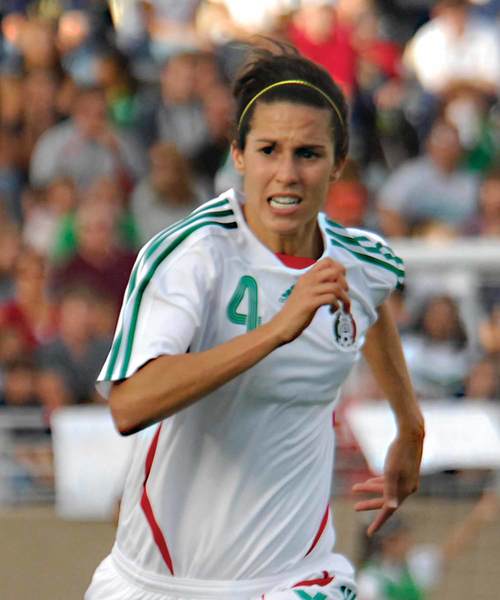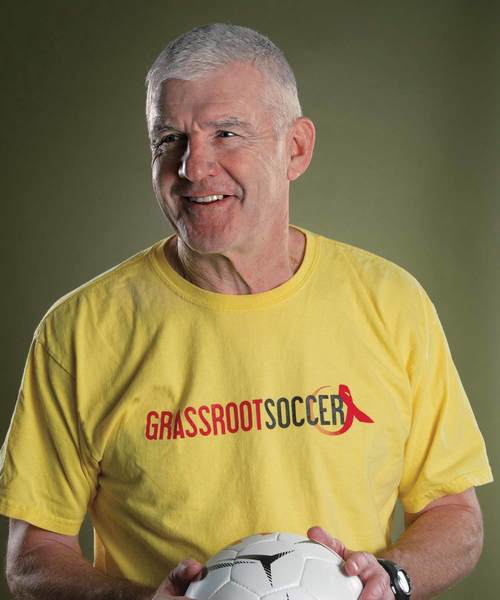
Monica Gonzalez
Where Soccer and Leadership Flourish
For as long as she can remember, soccer was Monica Gonzalez’s life.
She played with her three brothers, beginning so young she can’t even remember how she started, or how old she was at the time. When she was 10, Gonzalez first learned that other girls played soccer, but by then she had already developed a reputation as a unique talent and was playing in the boys’ league. At age 13, she found out that she could finance her college education through soccer, a goal she realized with a scholarship to the University of Notre Dame.
From there, Gonzalez became a founding member of Mexico’s women’s national team, serving as a captain for several years, including during its lone Olympic appearance (2004), and becoming the face of Mexican women’s soccer. The Boston Breakers of the Women’s United Soccer Association (WUSA) made Gonzalez a first-round draft pick after she led Notre Dame to three NCAA Women’s College Cup (final four) appearances in four seasons.
But at age 30, it all came apart.
The WUSA had folded a few years earlier, and the Mexican national team had failed to qualify for the 2008 Olympics and the 2007 Women’s World Cup. Even though Gonzalez had been recognized as both an All-American and an Academic All-American while earning degrees in management information systems and Spanish from Notre Dame, it felt to her very much like the end.
Playing soccer had been more than her life; it became her identity, or so it seemed.
When the latest incarnation of North American women’s professional soccer appeared in 2009, Gonzalez pursued the game to Chicago. As a means of supporting herself while attempting to earn a spot on the Chicago Red Stars roster, Gonzalez and another player presented a one-day soccer clinic for young girls in the Pilsen neighborhood of Chicago.
“It was a one-time deal. We charged the girls five dollars each—just enough for lunch money for a couple of days,” says Gonzalez with a laugh.
A couple of days later, the calls started. The girls wanted to know when Monica was coming back. So Gonzalez returned—and this time it wasn’t for lunch money.
“A lot of these girls were getting caught up with gangs, or with boys who were in gangs and their parents were begging us, ‘Save my children,’” says Gonzalez.
“So I realized that I had to find a way to get these girls training and help them with life skills,” she says, noting statistics reflecting higher-than-average incidence within the Hispanic community of teen pregnancy, obesity and other at-risk behavior.
“I became invested in them,” says Gonzalez. “But at the same time, these girls were giving me meaning in my life when I had just retired.
“Because retiring stinks, especially when it’s not on your own terms.”
Gonzalez’s bid to make the Red Stars failed, but she remained in Chicago, and Gonzo Soccer was born.
With the help of Jeff Welsh, who hosted that very first clinic at Chitown Futbol and continues to provide free space and other support to Gonzo Soccer through his Chicago Youth Development Program, Gonzalez went all-in in the lives of those girls. Gonzo Soccer offers girls in underserved communities soccer and life skills training to develop health and fitness, academic performance and personal development.
“I stayed in Chicago for two years until I got the Academy up and running, until I felt I had coaches for the girls that were at a high level,” she says.
Gonzalez saw herself in many of the young girls, who lacked playing opportunities that would allow them to maximize their ability and grow as players—and as young women.
“All these girls with immigrant parents, they don’t have a clue of what’s out there for them,” she says. “That’s the difference between me and them—I had a dad who was proactive about making sure I played in places where I could develop as a player.”
In Gonzalez’s native Corpus Christi (Texas), that meant her father demanding that she be allowed to play for four years as the only girl in an all-boys’ league, starting at age five. When she was 10, her family moved to the Dallas area. There, her father, who was a goalkeeper on the United States national team in the 1972 Munich Olympic Games, left no stone unturned in finding opportunities for Gonzalez to play her way onto elite teams.
“I was too young to realize where my soccer career was going to go,” says Gonzalez of her early playing days. “If my family hadn’t moved to Dallas, I don’t know what would have happened to my soccer career.”
One of the very first girls to show up at Gonzo Soccer was a seventh grader who was already hanging around with older kids who weren’t a good influence in her life—all too common among Academy participants. Once indifferent to school and at great risk of winding up in the juvenile justice system, that young woman was recently elected team captain of her high school varsity team and now boasts the grades and soccer skills to play at the Division I college level, according to Gonzalez.
“We just brought her into the Academy and made her realize she was good, made her realize she was special,” says Gonzalez.
“She [Gonzalez] made me realize that someone does care about me besides my parents,” says the young woman. “Monica was the first Hispanic woman who ever paid attention to me, who wants Hispanic girls to come out of where they are.”
But Gonzalez isn’t trying to create world-class soccer players, she’s trying to create world-class young women. So with all of that special attention comes responsibility.
“We put expectations on them,” says Gonzalez.
Those expectations are not for prima donnas. All of the girls, but especially the best of the best in terms of soccer skills at Gonzo Soccer, are expected to hit the books, make good decisions and give back to the community, starting in the Academy. One of Gonzalez’s prize pupils leads younger girls in drills, shepherds them during Academy field trips and volunteers as a high school coach.
“You feel that responsibility and you feel important,” Gonzalez explains.
“Monica has always told me, and my mom has always told me that young girls look up to me, but I never believed them,” says one of Gonzo’s stars. “But now young girls are saying, ‘I want to play like you … I want to be like you.’ So I have to be straight for them.”
Of course, few of the girls who attend Gonzo Soccer—which has added a second Chicago location and also expanded to Houston, Del Rio (Texas), and Tijuana, Mexico—are destined to have playing careers like Gonzalez had.
“They have a place to play,” says Gonzalez of all the girls, regardless of soccer skill level.
“I try to make them feel like the lucky ones.
“Girls who play soccer are less likely to get into a relationship where they’ll be pressured to do things that aren’t good for them,” she says. “They have more self-esteem so they know how to say no.”
Gonzalez is well aware that the star power she and her fellow coaches bring extends beyond their ability to impart soccer knowledge.
“We try to prevent things before they happen,” she says of Gonzo Soccer’s efforts to help the girls develop life skills. As but one example, Gonzo Soccer brings in a local agency once a year to discuss teen pregnancy with girls 12 and over.
“They do a 20-minute ‘scare-fest,’” says Gonzalez. “And then we tell them it’s not cool to have a baby when you’re in school.
“And they believe us when we say it’s not cool because they think we’re cool,” she says with a laugh.
The parents recognize and appreciate the rapport that Gonzalez and the other Gonzo Soccer coaches and leaders enjoy with the girls.
“My daughter was in that teenage phase,” shares one mother. “She wouldn’t listen to me. But Monica would talk to her and say, ‘You have to set goals,’ and she would listen to her.
“She has very close relationships with the girls there,” continues the mother. “Without that support, I don’t think she would have the opportunities she has right now.”
So now, even though her competitive playing days are over, soccer is indeed Gonzalez’s life. In addition to Gonzo Soccer, she is a rising star at ESPN, providing expert analysis on women’s and men’s soccer telecasts and offering commentary and insights on a wide range of subjects pertaining to sports and society.
But it was through the death of her playing career that she now gives life to the playing careers—and more—of so many young women.
“I kind of didn’t want to have a dream at the beginning,” says Gonzalez of the genesis of Gonzo Soccer. “Because I want it to go where it needed to go, not where I wanted it to go.”
Now, though, the dreams and the direction are obvious. They’re being lived out in the lives of the hundreds of girls Gonzalez is touching, all across North America.

